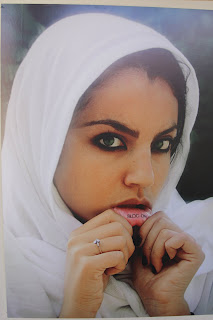
 Hmong girl selling bracelets in Laos: "You can buy 5,000."
Hmong girl selling bracelets in Laos: "You can buy 5,000."There's no escaping child labor in Cambodia.* If you're white, you'll get swarmed by men lounging on motorcycles calling out "tuk-tuk, ladyyy?" and kids selling copied books and dime-a-dozen bracelets. They're relentless, because poverty makes people relentless. So many parts of Siem Reap and Phnom Penh were just cacophonies of garbage on stilts; huge teeming masses of people and stray dogs and dirt. There is a 15 km road from Phnom Penh to the Killing Fields, which is a chaotic study in development. As we scooted along in our tuk-tuk, a factory opened its doors for lunchtime and hundreds of face-masked young girls streamed out, having finished their morning stitching or gluing and preparing for an afternoon filled with more of the same. I wondered what they were making in the factory, what expensive items were being created cheaply so people like me can buy them for less. But I was soon distracted by a new olfactory assault, rising above the old fish and urine smells. We were driving over the river, into which was gushing forth a broad stream of aparently untreated sewage. On the shore, a garbage dump, on fire. And wandering amidst all of this, a shirtless 13 year old boy. What an apocalyptic scene this was, unpleasant for eyes and ears and heart. But our tuk-tuk zipped past all of this, leaving the tottering houses and shops on stilts above the river to fend for themselves.
 "Being a baby is sooo BORING sometimes."
"Being a baby is sooo BORING sometimes."Later, after a long day scrambling up the wats, Amy and I set out with a mission to find margaritas at the Mexican restaurant in Siem Reap and ran into a couple of the same boys twice in a row, each time begging us to buy postcards from them. We chatted with them for a while and learned that Hou, age 14, and Phi, age 16, were a couple of the sweetest kiddos in the country. They had been selling bracelets all day without eating, so we took them to the restaurant with us and taught them the word "happy hour" and how to eat tacos. They had never had Mexican food before and Hou practically bathed in the salsa, he loved it so much. We asked them what they wanted to be when they grew up and Hou said "tuk-tuk driver!" while Phi chose, "teacher, and I want to start an orphanage as well." As we parted ways later, Hou said "thank you so, so much for dinner. Here is how we say it in Cambodia: Akhun, akhun, akhun." Later, they ran after us and pushed the little woven bracelets onto our wrists as a parting gift.
The next night, we saw them again. We had been drinking a bit of Angkor draft at dinner and feeling lighthearted, but that quickly faded as we wandered into a street food alley to buy the boys dinner again. We got swarmed by about a dozen other kids, and two girls holding a naked baby, begging for food and money. Fine, easy enough, we can buy noodles for ten kids and spend less than what we would have spent on a round of beers at home. The baby, though, was another issue. He slept peacefully throughout the turmoil, but his sisters gripped our hands with surprising tenacity and begged us for milk. Eventually they clung neatly to our torsos, all four limbs wrapped tightly around our waists, after they handed the dozing baby (who had long since learned to sleep amidst noise and motion) off to Amy. We had a 20-second span in which we thought, "OH MY GOSH, this is what Angelina Jolie felt like before she stole** Maddox!"

Today she may be a toothless Vietnamese girl, but she's leaving this one-horse town for Hollywood.
This brought us to the last, most disappointing thing we saw in Cambodia. Having made friends with another kid selling books, we bought "Buddhism Explained" from him one night in Phnom Penh. He rushed over to a middle aged man with a money basket on a bike to toss his cash in. Mom beckoned him back over to our table to ask what would happen to that money later. "That man buys my school uniform and pays my tuition and buys me dinner," our new friend insisted. Essentially the guy was a pimp reminiscent of the newspaper barons who were the source of the newsies strike (historical fact courtesy of Christian Bale). Shortly after, as we lingered over dinner, we heard a shouting match and saw another kid, whose block was being infringed upon by our friend and his pimp, trying to regain his book-selling territory. We watched wide-eyed as a grown man and a kid no more than ten fought loudly in the street, which ended with the man hitting the kid and throwing him to the ground. Wiping away furious tears, the kid regained his footing and kept screaming. All this, just so they can sell a few photocopied books for a couple bucks a pop. I am as speechless now as I was at that moment. What can you do, as a foreigner who doesn't speak the language, when you see such a thing happening? There really is no such thing as childhood when people fight as equals for the right to work.
*I've long since left behind the idea that it's terrible to let kids work. In most parts of the world, it's just a fact of life, and something that often provides education for them rather than preventing it. Although it's not ideal to let kids wander the streets at midnight trying to sell postcards, a better question than "how can we stop poor kids from working?" is "how can we make it safe and profitable for poor kids to work in order to attend school?"
**"Adopted."












